News
Follow Us on Social Media
Margie Shaw quoted in Medical Ethics Advisor
At Strong Memorial Hospital, our clinical ethics team—led by Margie Hodges Shaw, JD, MA, PhD, HEC-C—is transforming how consult data informs education and supports better patient care. By tracking key elements of every consult, the team is uncovering trends like rising treatment refusals and growing surrogate decision-making conflicts, then using those insights to create targeted learning opportunities for clinicians.
URMC also offers an online portal for non-urgent ethics questions, building an open forum for shared learning across the institution.
Alex Parry published in JAMA Pediatrics: “Why We Should Defend the Consumer Product Safety Commission”
From architectural glass to toys and everyday household items, millions of product-related injuries continue to send patients, especially children, into emergency departments each year. With regulatory protection weakening and dangerous products still entering US homes, the authors argue it’s time for the medical community to speak up again.
Christine Slobogin, PhD, deep dives into the Departmental Podcast “In the Same Vein” with Jeff Koslofsky
Our faculty member, Dr. Christine Slobogin, joined Jeff Koslofsky on his podcast, Jeff’s Show Notes, and YouTube channel to discuss “Building a Student-Forward Podcast in Medical Humanities.”
The hosts take listeners behind the scenes of In the Same Vein, explaining why she designed the podcast around student voices and what happens when trainees lead the way. She and Jeff explore
- How students choose guests and shape each episode from the ground up
- The storytelling, communication, and interviewing skills students gain
- How podcasting helps trainees build confidence, think on their feet, and navigate academic life
- Why a student-centered approach transforms both the learning experience and the final product
It’s an inspiring conversation about mentorship, creativity, and the power of giving students the mic. Now available on YouTube and Spotify.
Trisha K. Paul, MD, MFA, receives a publication featured in Academic Medicine
This piece showcases innovative approaches to reflective practice in health humanities and contributes to a growing body of work shaping how learners engage with meaning-making in clinical education.
Explore the full article on PubMed and join us in celebrating this important contribution to the field:
https://pubmed.ncbi.nlm.nih.gov/41042838/
Jon Herington and Kwasi Boaitey published in Palliative & Supportive Care— “Expanding End-of-Life Options for Incarcerated Individuals.”
This new publication explores the urgent question of how to provide ethical, dignified end-of-life care for an aging prison population. Using New York State as a case study, the authors argue for expanding medical release programs—highlighting barriers, ethical considerations, and key policy recommendations.
Read the full article: https://journals.sagepub.com/doi/full/10.1177/10499091251405383
The latest piece in the Journal of Clinical Oncology by Trisha K. Paul, MD, MFA
Are You Bereaved? – A deeply personal reflection by a pediatric oncology fellow and palliative care physician. The article delves into the experiences of grief and loss within oncological care, highlighting the emotional journeys that patients, families, and caregivers go through.
Read the full article → https://ascopubs.org/doi/10.1200/JCO-25-00991
Marie-Patricia Luck, M.B.Ch.B. has New Publication on the Teaching Landscape of Health Humanities
We are pleased to announce the early release of a new publication authored in collaboration with the Health Humanities Consortium Committee on Curriculum and Assessment. Over the past two years, our team of health humanities scholars, researchers, and educators has worked to better understand how the health humanities are taught across undergraduate, graduate, and medical school curricula.
Laura Stamm, PhD has New Publications on Ethical Research and Provider Support for Transgender and Gender-Diverse Communities
- "Ethical considerations for conducting research with transgender and gender-diverse patient registries: Balancing our need for evidence with patient vulnerability" published in the Journal of Public Health Research.
- "Supporting Providers Who Care for Transgender and Gender-Diverse Youth: A Guide for Institutions"
currently in press with The Journal of Pediatrics.
Dr. Bryanna Moore has three articles for The American Journal of Bioethics (AJOB)
- “Do Reasons Matter? Navigating Parents’ Reasons in Healthcare Decisions for Children”
Are parents’ reasons for their children’s medical treatment merely a practical matter, or do they carry ethical weight?
Read here: https://www.tandfonline.com/doi/full/10.1080/15265161.2024.2388730 - “We Agree–Centering Parents’ Reasons is Dangerous”
In proposing a sharper boundary between parental reasoning and medical ethics, the authors challenge us to rethink how we respect—not override—family autonomy in the clinical setting.Read here: https://www.tandfonline.com/doi/full/10.1080/15265161.2025.257067
“Substituted Judgment and Uncomfortable Truths”
Read here: https://www.tandfonline.com/doi/full/10.1080/15265161.2025.2560764
This guest editorial pulls back the curtain on the comfort zone of substituted judgment—questioning whether ‘what the patient would’ve wanted’ truly guides the moral conversation at the bedside.
Dr. Laura Stamm earns “Ever Better Graduate Mentor” recognition
This initiative celebrates mentors who have gone above and beyond in supporting graduate students’ academic and professional development. Your dedication, guidance, and support make a lasting difference in the graduate student experience at the University of Rochester. Thank you for your commitment to mentoring!
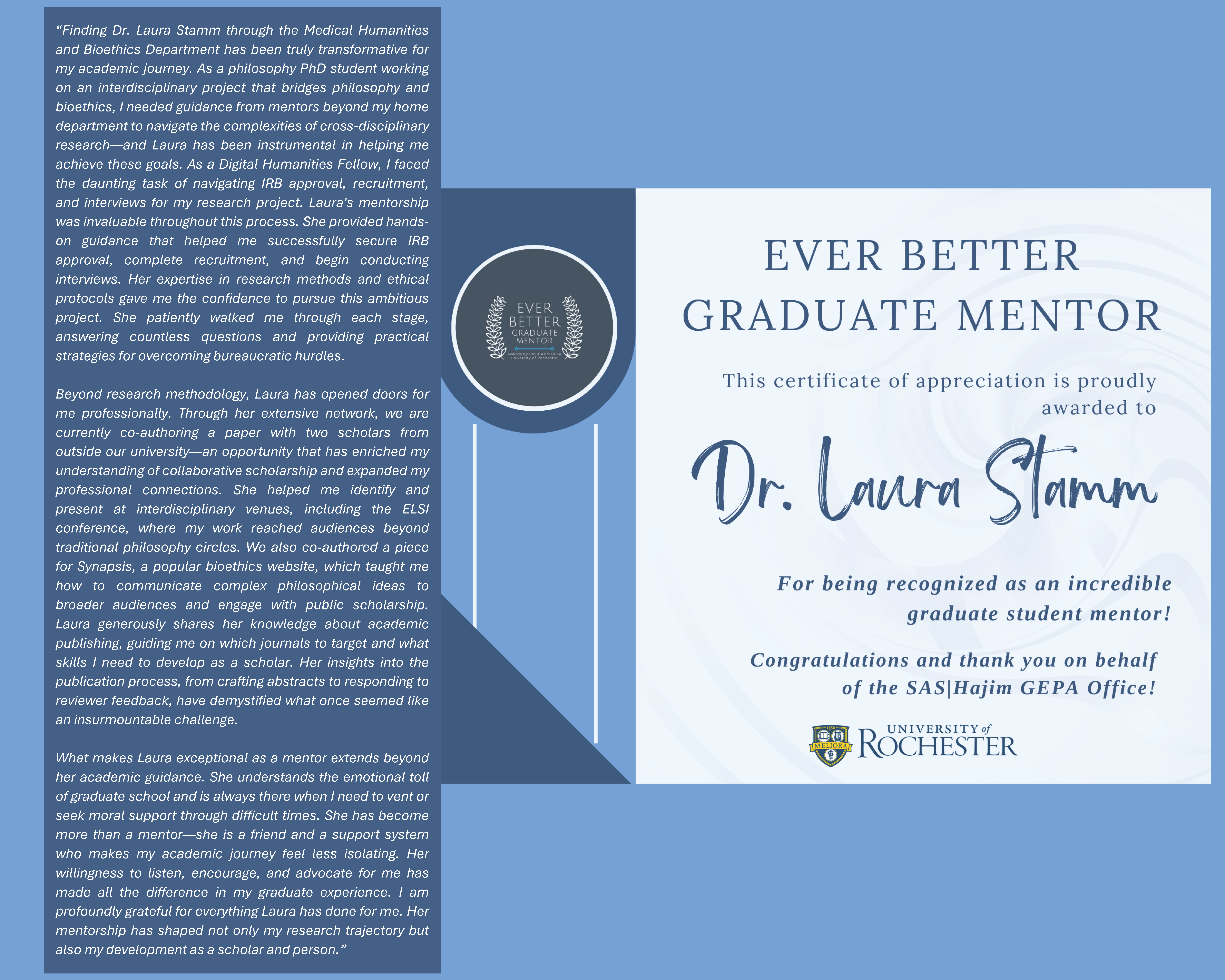
Community water fluoridation works: Experts debunk myths, highlight lifelong benefits
Lainie Ross, MD, PhD, chair of Health Humanities and Bioethics, spoke to MSN (Oct. 14) about the importance of separating science from misinformation surrounding community water fluoridation. Ross said that decades of research confirm fluoridation’s safety and effectiveness. “We must ensure that policy decisions reflect high-quality evidence, not fear or flawed data,” Ross said. “Fluoridation has a proven record of safety and success in improving oral health equity.”
Health Humanities and Bioethics Alum Alejandro Vera, guest speaker on the SMD podcast “The Next Step.”
In the latest episode of The Next Step, Alejandro Vera '23 M (MS) shares his journey from the Bay Area to Rochester, where he discovered his passion for health humanities and bioethics. We talk about why this field is so important for connecting science, medicine, and the human experience, and how the program shaped his graduate education path.
Alejandro also shares how taking a year after graduation to pause and write his story gave him clarity heading into his PhD at The University of Texas Medical Branch, and why meeting people and building connections has been one of the most valuable lessons along the way.
Access the recording here: https://www.linkedin.com/events/7376595287311572992/
Laura Stamm, PhD, receives two publications from RWJF-Funded Research
Journal of Adolescent Health focuses on provider moral distress caring for transgender youth in the current sociopolitical climate.
International Journal of Transgender Health is a secondary analysis emphasizing identity-based distress in queer and queer-adjacent providers of gender-affirming care.
Margie Shaw, JD, PhD, co-author on “The Need for Accreditation Standards for Clinical Ethics Fellowship Programs.”
Access it here: https://www.tandfonline.com/doi/full/10.1080/15265161.2025.2552702
Andrew Lea, MD, PhD, co-author on "Advancing Medical Artificial Intelligence Using a Century of Cases"
“For over a century, the New England Journal of Medicine Clinicopathological Conferences (CPCs) have tested the reasoning of expert physicians and, recently, artificial intelligence (AI). However, prior AI evaluations have focused on final diagnoses without addressing the multifaceted reasoning and presentation skills required of expert discussants.”
Access it here: https://arxiv.org/abs/2509.12194
New article from Jonathan Herington, PhD: “Musicians’ ethical concerns about AI: an interview study”
Generative AI in music (GAIM) is reshaping music production, raising both excitement and concern among artists. Drawing from interviews with 43 musicians across genres, this study explores tensions between opportunity and risk—creativity versus job loss, openness versus exploitation, and access versus inequity—highlighting the ethical and justice implications of GAIM’s growing role in the music industry.
Access the article here: https://doi.org/10.1007/s00146-025-02601-6
Season 2 Teaser for "In the Same Vein"!
"In the Same Vein" is a podcast about how medicine, the humanities, and ethics are all intertwined. Through interviews with scholars working on vital and innovative topics in the health humanities and in bioethics, this podcast explores how the study of the humanities influences medical practice and how, in turn, medicine influences the study of the humanities. Each episode will be co-hosted by a University of Rochester student and professor. As a pair, they'll be asking questions of scholars and writers whom the students themselves have chosen to meet with and interview for their co-hosted episode. In this podcast, we aim to demonstrate how disciplines within the humanities and medicine, which are often discussed separately, in fact share many of the same goals. In reality, the humanities, medicine, and ethics all run in the same vein.
On Spotify: https://open.spotify.com/episode/15H3PmmPhIJyZ3sgzgQEvs?si=bd4f3016b42a421f
On Apple Podcasts: https://podcasts.apple.com/us/podcast/in-the-same-vein/id1768803040?i=1000726911929
New blog post from Bryanna Moore
Bry interviewed her colleague/friend Brent Kious back in July. Really fun conversation.
Jon Herington (right) at the 67th annual meeting of the American Association of Physicists in Medicine (July 2025)
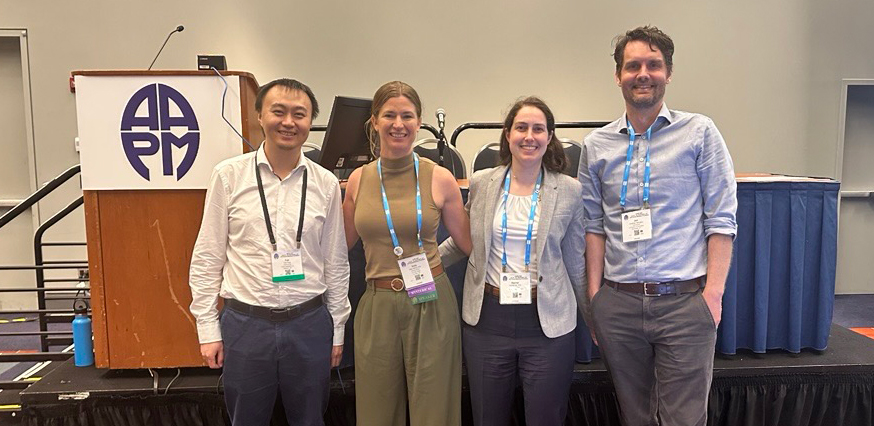 His talk was titled, “AI, Bias, and the Ethics of Patient Care” in the session WE-305-201 - Ethical Considerations in the Use of AI in Medical Physics: Balancing Innovation and Responsibility
His talk was titled, “AI, Bias, and the Ethics of Patient Care” in the session WE-305-201 - Ethical Considerations in the Use of AI in Medical Physics: Balancing Innovation and Responsibility
American Academy of Pediatrics (AAP) Appoints Lainie Ross as Chair of Committee on Bioethics
Dr. Ross begins a four-year term on July 1 and will lead American Academy of Pediatrics pediatric ethics policy development and liaison roles, building on over two decades of AAP ethics leadership.
Should Pediatricians Recommend Therapy Chatbots to Patients?
 Bryanna Moore gives her answer to this question in an interview she gave to Sara Kellner from Healio news.
Bryanna Moore gives her answer to this question in an interview she gave to Sara Kellner from Healio news.
Want to be a better doctor or nurse? Take a look at this painting
Congratulations Laura Stamm – Susan B. Anthony Emerging Leader Award Winner
Christy Slobogin Named Visiting Scholar at Center for Health Humanities at Massachusetts College of Pharmacy & Health Sciences
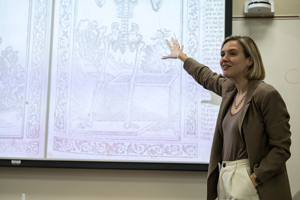 Dr. Slobogin will be a visiting scholar at the Center for Health Humanities at Massachusetts College of Pharmacy & Health Sciences from March 30-April 12, 2025. She will be giving a talk in Boston on April 3rd at 12:30PM titled “Putting Plastic Surgery on Paper: How Art and Archives Defined Second World War Reconstructive Surgery in Britain.”
Dr. Slobogin will be a visiting scholar at the Center for Health Humanities at Massachusetts College of Pharmacy & Health Sciences from March 30-April 12, 2025. She will be giving a talk in Boston on April 3rd at 12:30PM titled “Putting Plastic Surgery on Paper: How Art and Archives Defined Second World War Reconstructive Surgery in Britain.”
Plastic surgery in twentieth-century Britain was a medical discipline with deep ties to art, artists, and art history. It was also a field still in the process of creating its reputation and its archives. This talk, based on material from Dr. Slobogin’s forthcoming book, examines these archives, focusing in particular on the works on paper held within these collections by two artists: Diana “Dickie” Orpen and Percy Hennell. Plastic surgeons depended upon the drawings and photographs made by these and other medical illustrators to craft certain narratives about their field and their surgical practice.
In addition to outlining an art history of plastic surgery during this period, this talk engages with the affective parameters of archival objects, and with what working as a historian involves when done within potentially traumatic spaces. Paying particular attention to the emotional dimensions and effects of this visual culture and the ways in which it is archived and framed by the discipline of plastic surgery – then and now – this research explores not only what it meant to make art in a surgical space, but also what it means to study these affecting paper objects in the archive today.
To watch her talk virtually, please use this link: Putting Plastic Surgery on Paper: How Art and Archives Defined Second World War Reconstructive Surgery in Britain - Massachusetts College of Pharmacy and Health Sciences
Dr. Slobogin’s book is also available for pre-order: https://boydellandbrewer.com/9781648251207/putting-plastic-surgery-on-paper/
Gaelen McCormick Selected for Symposium Panel
We are excited to share an upcoming two-part symposium on the impact of live music in the healthcare environment, and higher education's role in developing this path. This is sponsored by the Institute for Music Leadership at the Eastman School of Music and will happen on zoom.
Panel 1 on March 28th will have musicians who regularly work in the healthcare spaces providing environmental music, and the impact this has on their lives as artists. Panelists are Camille Zamora (Sing for Hope), Dan Kuehler (Hillsdale College), and Jeremy Jordan (PMHU).
Panel 2 on April 3rd will have leaders in higher education who have created training programs for musicians to help create safe and appropriate pathways to enter the space. Panelists are Ferol Carytsas (U. Florida Shands Center for Arts in Medicine), Sarah Hoover (Johns Hopkins), and Mary Perkinson (U. Nebraska Omaha).
Gaelen McCormick, the director of Eastman Performing Arts in Medicine (EPAM), will also participated on the panels and share EPAM’s model of having music therapists co-plan and deliver the training to their musicians at URMC.
Provost Sampson cordially invites you to attend the Phelps Colloquium
Defining 'Best Interest' in Pediatric Care: A Comparative Analysis of US and UK Approaches
Nearly all pediatric guidelines emphasize that parental decisions should prioritize the child's best interest. This raises many questions: What is meant by best? Who defines what is best? And How is the best interest standard applied in particular cases? In this talk, we will explore the concept of “best interest” in pediatric decision-making and compare and contrast the role of the best interest standard in the US and the UK using a case study.
Presented by:

Lainie Ross, M.D.
Dean's Professorship in the Department of Health Humanities and Bioethics
Chair of the Department of Health Humanities and Bioethics
Director, Paul M. Schyve, MD Center for Bioethics in the Department of Health Humanities and Bioethics
Professor in the Department of Neurology, the Department of Pediatrics and the Department of Philosophy
Wednesday, March 5, 2025 4:00-5:30 p.m
Eisenberg Rotunda, Schlegel Hall
Simon Business School
(Library Lot parking code available upon request adele.coelho@rochester.edu)
RSVP:
The Phelps Colloquium lecture series gives faculty opportunities to hear about research taking place campus-wide, spend time with colleagues outside their normal spheres, and promote cross-school and cross-discipline collaborations. The program was founded in 2004 by former provost Chuck Phelps. The talks are preceded by a small reception and followed by an opportunity for informal discussion.
Questions and Accommodation Requests: adele.coelho@rochester.edu
Margie Hodges Shaw Named Secretary/Treasurer for Council on Program Accreditation for Clinical Ethicists Training
 The Committee on Accreditation (CoA) announced their new board members for the Council on Program Accreditation for Clinical Ethics Training (CoPACET). We are very excited the Margie Hodges Shaw, JD, PhD, MA, HEC-C, has been named as the Secretary/Treasurer for this next term.
The Committee on Accreditation (CoA) announced their new board members for the Council on Program Accreditation for Clinical Ethics Training (CoPACET). We are very excited the Margie Hodges Shaw, JD, PhD, MA, HEC-C, has been named as the Secretary/Treasurer for this next term.
Congratulations Margie!
Christine Slobogin Receives Grant from Yale’s Paul Mellon Centre for Studies in British Art
At the Centre’s Advisory Council meeting, Dr. Slobogin was awarded an author grant for her book publication, “Putting Plastic Surgery on Paper: How Art & Archives Defined Second World War Reconstructive Surgery in Britain.” Congratulations Christy!
Lainie Ross Speaks with NPR about Pig Kidney Transplant
Dr. Ross spoke to NPR report Rob Stein about the ethical issue with patients receiving pig kidney transplants.
Wendy Gonaver Guest Speaker on IDEAL Podcast

Christine Slobogin Receives Faculty Open Access Publishing Grant
 Dr. Slobogin is a recipient of the Faculty Open Access Publishing Grant for her book, Putting Plastic Surgery on Paper: How Art and Archives Defined Second World War Reconstructive Surgery in Britain (under contract with the University of Rochester Press).
Dr. Slobogin is a recipient of the Faculty Open Access Publishing Grant for her book, Putting Plastic Surgery on Paper: How Art and Archives Defined Second World War Reconstructive Surgery in Britain (under contract with the University of Rochester Press).
The Faculty Open Access Publishing Grant (created in collaboration with River Campus Libraries) supports faculty publications in open access formats, ensuring that they reach a broad audience and receive the recognition they deserve.
Congratulations Christy!
Laura Stamm Podcast Interview
Laura Stamm was recently interviewed for the podcast High Theory, speaking about her book The Queer Biopic in the AIDS Era.
Dr. Nicholas Mercado Giving Opening Keynote & Panel Discussion on Family Caregiving
We are very excited to announce that Nicholas Mercado, DrPH, MS-HPE, MCHES, HEC-C, will be giving the opening keynote presentation and participating on a panel at the National Family Caregivers Month Webinar on November 6th. The topic is “Conversations on Caregiving, Ethics, and Elder Mistreatment.” You can register with the link provided.
MS Program Alum Ebony Allen Receives Promotion
Ebony Allen, an alumnus of our Master’s in Medical Humanities program, was recently promoted to Senior Compliance Analyst at Centene. In her new role, she will assist in maintaining the company’s compliance program and provide guidance as subject matter expert for implementation of California State bills, state regulars All Plan Letters and reporting. She will also be identifying gaps and assist in implementing internal controls. Besides researching/interpreting laws and regulations, a big part of Ebony’s role is reviewing internal and member facing documents.
Congratulations Ebony!
Can A.I. Help Families Make Difficult End-of-Life Care Decisions?
Our own Bryanna Moore, PhD, spoke with NBC news from a bioethics perspective.
Jon Herington Featured in Rochester Review Top Story: Doctors, patients, and avatars
New Eastman Performing Arts Medicine Center Integrates Music in Healing
Congratulations to Galaen McCormick and her EPAM team for their recognition as a Center at URMC, a designation that represents the growing impact of how music and art can aide in the healing process. Read the full article here and watch the information video about all of the amazing things that EPAM has to offer.
Welcome Dr. Alexander Parry
 We are pleased to announce that Alexander Parry, PhD has joined our department as an Assistant Professor. He recently received his PhD from the Johns Hopkins Department of The History of Medicine. Alex studies the history of public health from the early 19th century to the present & focuses on physical injuries & consumer protection. He recently defended his dissertation, “Injured America: Home Accidents & the Voluntary Safety System, 1920-1980”, which he plans to convert into a book. He will be teaching two graduate level courses: MHB 473 Unsafe America: Accidents, Disasters, and Society from 1800-2020 and MHB 500 History of Modern Medicine from the 18th Century to the Present.
We are pleased to announce that Alexander Parry, PhD has joined our department as an Assistant Professor. He recently received his PhD from the Johns Hopkins Department of The History of Medicine. Alex studies the history of public health from the early 19th century to the present & focuses on physical injuries & consumer protection. He recently defended his dissertation, “Injured America: Home Accidents & the Voluntary Safety System, 1920-1980”, which he plans to convert into a book. He will be teaching two graduate level courses: MHB 473 Unsafe America: Accidents, Disasters, and Society from 1800-2020 and MHB 500 History of Modern Medicine from the 18th Century to the Present.
Please join us in welcoming Alex to our department and to our University
Lainie Ross awarded Distinguished Graduate Award from Penn
 Lainie Ross, Dean’s Professor and the inaugural chair of the Department of Health Humanities and Bioethics, received the University of Pennsylvania’s Distinguished Graduate Award, for her nationally and internationally recognized work addressing ethical and policy issues in transplant, pediatrics, genetics, research, and health care disparities. Ross is also the director of Rochester’s Paul M Schyve, MD Center for Bioethics and holds secondary appointments in the Departments of Pediatrics and Philosophy.
Lainie Ross, Dean’s Professor and the inaugural chair of the Department of Health Humanities and Bioethics, received the University of Pennsylvania’s Distinguished Graduate Award, for her nationally and internationally recognized work addressing ethical and policy issues in transplant, pediatrics, genetics, research, and health care disparities. Ross is also the director of Rochester’s Paul M Schyve, MD Center for Bioethics and holds secondary appointments in the Departments of Pediatrics and Philosophy.
With the award, Ross, who earned her medical degree from the Perelman School of Medicine at the University of Pennsylvania, joins the ranks of accomplished alumni honored for their outstanding service to the medical profession and to society at-large.
- Read the Rochester Review story about the collaboration between the Department of Health Humanities and Bioethics and the Humanities Center.
Patricia Luck Receives Dean’s Teaching Fellowship
Dr. Patricia Luck was a recipient for the 2024-2026 Dean’s Teaching Fellowship. The name of her project is “The Photo/Tiny Story: A Health Humanities Tool for Developing Critical Reflection Skills in Undergraduate Medical Education.” The Photo/Tiny Story, a novel Health Humanities mixed-medium reflection tool, has recently been integrated into multiple courses within the undergraduate medical curriculum at the University of Rochester School of Medicine and Dentistry. The Photo/Tiny Story offers students a brief, accessible, and resource efficient method for facilitating reflection on the development of core competencies and skills regarding aspects of professional development, providing insight and self-awareness into themselves and their developing proficiency for a biopsychosocial approach to care. This project aims to examine the longitudinal development of medical students’ critical reflection skills by integrating a reflection tool from the health humanities.
Laura Stamm Awarded a Robert Wood Johnson Health Equity Scholars for Action Grant
Dr. Stamm, a faculty member in the Department of Health Humanities & Bioethics and the Director of Engagement and Enrichment for the Department of Medicine, was selected by the Robert Wood Johnson Foundation as Health Equity Scholar for Action. The program aims to create actionable evidence that address the root causes of health inequities in the United States, and her research will focus on factors that influence the equitable delivery of transgender care.
Dr. Margie Shaw Nominated for Faculty Address During URSMD MD Commencement Ceremony
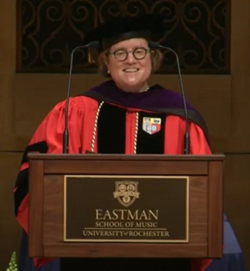 Dr. Margie Shaw was nominated by the URSMD MD Class of 2024 to give the Faculty Address during their commencement ceremony on May 18th, 2024. Dr Shaw describes this as “one of the greatest honors of my life.”
Dr. Margie Shaw was nominated by the URSMD MD Class of 2024 to give the Faculty Address during their commencement ceremony on May 18th, 2024. Dr Shaw describes this as “one of the greatest honors of my life.”
Congratulations Margie!
Welcome Dr. Bryanna Moore
 We are very pleased to announce our newest faculty member joining our Health Humanities & Bioethics team. Dr. Bryanna Moore is coming to us from the Department of Bioethics & Health Humanities at the University of Texas Medical Branch (UTMB) in Galveston, Texas. She was the director of the clinical ethics fellowship program and serves as chair of the American Society for Bioethics and Humanities’ Pediatric Ethics Affinity Group.
We are very pleased to announce our newest faculty member joining our Health Humanities & Bioethics team. Dr. Bryanna Moore is coming to us from the Department of Bioethics & Health Humanities at the University of Texas Medical Branch (UTMB) in Galveston, Texas. She was the director of the clinical ethics fellowship program and serves as chair of the American Society for Bioethics and Humanities’ Pediatric Ethics Affinity Group.
Bry received her PhD in Philosophy from Monash University in Melbourne, Australia, before completing postdoctoral fellowships at Children's Mercy Hospital and Baylor College of Medicine. Her research interests span pediatric ethics, medical decision‐making, virtue ethics, and death studies.
Please join us in welcoming Bry to our department and to our University.
Mical Raz Speaks About Problems with the American Child Welfare System – WXXI Connections with Evan Dawson
Healing arts and letters: A Collaboration with the Humanities Center and the Department of Health Humanities & Bioethics
 Lainie Ross and Peter Christensen sat down with the Rochester Review to discuss the collaboration efforts between the Department of Health Humanities & Bioethics and the Humanities Center on River Campus. The spoke about the beginning of the collaboration and the development of the year-long series on grief.
Lainie Ross and Peter Christensen sat down with the Rochester Review to discuss the collaboration efforts between the Department of Health Humanities & Bioethics and the Humanities Center on River Campus. The spoke about the beginning of the collaboration and the development of the year-long series on grief.
Lainie Ross Receives Distinguished Graduate Award from University of Pennsylvania
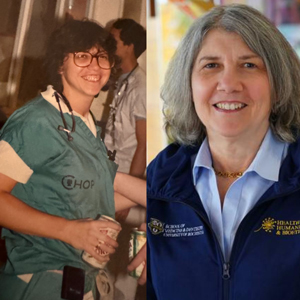 Since graduating from the University of Pennsylvania Perelman School of Medicine and serving as a resident at Children's Hospital of Philadelphia Lainie Ross hasn’t stopped.
Since graduating from the University of Pennsylvania Perelman School of Medicine and serving as a resident at Children's Hospital of Philadelphia Lainie Ross hasn’t stopped.
She’s addressed ethical and policy issues in transplant, proposing solutions to the over-representation of women as living organ donors and the under-representation of women and Blacks as organ recipients. She’s responded to the call for expanding newborn screenings, contending in published research that broader genomic sequencing would worsen existing health disparities.
For these and many other accomplishments, the inaugural chair of our Department of Health Humanities and Bioethics received the 2024 Distinguished Graduate Award from Perelman. Congratulations, Dr. Ross!
And yes, to this day, she is still seen with a Diet Coke in hand (which she readily admits has been key to her success in medicine).
Bronwen McVeigh Accepts Postdoc Position at University College Dublin
 Bronwen McVeigh, who completed our MS Program in Medical Humanities while pursuing a PhD in Historical Musicology at the Eastman School, recently accepted a 3-year postdoc position at University College Dublin. Bronwen will be working on a well-funded EU project that investigates soundscapes, the built environment, and trauma. She will receive her PhD from Eastman this May and move to Dublin this summer.
Bronwen McVeigh, who completed our MS Program in Medical Humanities while pursuing a PhD in Historical Musicology at the Eastman School, recently accepted a 3-year postdoc position at University College Dublin. Bronwen will be working on a well-funded EU project that investigates soundscapes, the built environment, and trauma. She will receive her PhD from Eastman this May and move to Dublin this summer.
Congratulations to Bronwen on this massive achievement!
Lainie Ross and Christos Lazaridis talk about defining death - Elucidations
Dr. Lainie Ross was recently interviews on the podcast Elucidations, talking about the different ways of defining death
Dr. Christine Slobogin – How do images of the human body affect how we’re perceived and cared for by scientists and doctors?
Through the lens of art history, working with specific pieces of art and visual culture, Dr. Slobogin helps students explore how cultural interpretations of the body have influences our approach to healthcare.
Laura Stamm Recognized by Center for Community Health & Prevention as Part of Local Women Making a Difference in Community Health
Laura Stamm, PhD, is a rising change maker in the area of nondiscriminatory practices and belonging at the URMC.
Welcome Dr. Christine Slobogin
 The Department of Health Humanities & Bioethics (HHBE) at the University of Rochester’s School of Medicine & Dentistry is pleased to welcome new faculty member, Christine Slobogin, PhD. Prior to coming to the University of Rochester, Dr. Slobogin was a Postdoctoral Fellow in the History of Medicine and the Center for Medical Humanities & Social Medicine at Johns Hopkins University. Dr. Slobogin will begin her new role as an Assistant Professor on January 1, 2024.
The Department of Health Humanities & Bioethics (HHBE) at the University of Rochester’s School of Medicine & Dentistry is pleased to welcome new faculty member, Christine Slobogin, PhD. Prior to coming to the University of Rochester, Dr. Slobogin was a Postdoctoral Fellow in the History of Medicine and the Center for Medical Humanities & Social Medicine at Johns Hopkins University. Dr. Slobogin will begin her new role as an Assistant Professor on January 1, 2024.
Dr. Slobogin earned an MA from the Courtauld Institute of Art, University of London and her MPhil and PhD from Birbeck, University of London and. Her research resides at the crossroads of medical humanities, art history, affect studies and disability studies. Dr. Slobogin will teach a visual history of the body in science and medicine in our master’s program and will continue to create podcasts at the intersection of art, science & medicine.
“Dr. Slobogin’s scholarship is highly engaging and creative,” says Dr. Lainie Ross, Chair of HHBE. “We look forward to her contributions to our Department, the School of Medicine and Dentistry, and the Medical Center itself.”
Please join us in welcoming Dr. Slobogin to our department and to our university.
Jessica Shand Appointed to Dynamic Wellbeing Leadership Team
Jessica Shand will join S. Craig Rooney as leaders of the URMC’s Medical Faculty and Clinician Wellness Program. Together they will expand existing clinician wellbeing efforts and build an institution-wide program that will reach across all mission areas to benefit faculty, staff, and learners. Congratulations Jessica on your new role!
Gaelen McCormick Elected as Vice President of National Organization for Arts in Healthcare
Please join us in congratulating Gaelen McCormick, Director or Eastman Performing Arts Medicine with a secondary faculty appointment in the Department of Health Humanities and Bioethics, on her increasingly prominent national role. Gaelen was elected by the board of NOAH to step into the Vice President role in January 2024, and will move into the President role in 2026 for a two-year term.
Laura Stamm Contributing Writer for Synapsis: A Health Humanities Journal
Laura Stam has recently become a contributing writer for Synapsis: A Heath Humanities Journal. Her first piece takes a look at the film The Miseducation of Cameron Post which is set in 1993 and reminds audiences of the continued importance of fighting for LGBTQ+ rights.
Health Humanities & Bioethics Attend ASBH Annual Conference
The Department of Health Humanities & Bioethics attend the American Society of Bioethics & Humanities annual conference in October. Many members of our department presented at this years conference:
"Quantitative Bioethics: The Promise and Challenges of Using Advanced Quantitative Methods in Empirical Bioethics" – Jon Herington
"Exploring Moral Distress in Medical Education: Ontological Ambiguity and Cadaveric Dissection" – Erik Larsen, Margie Shaw, Christopher Mooney, & Natercia Rodrigues
"A Sinking Feeling: a Readers’ Theater Performance on Medical Malpractice" – Ramya Sampath & David Kaufman
"A Call to Tarry: A Journey Away from Turfing" – Patricia Luck & Arman Niknafs
"Dismantling the Museum: Protest and Reimagining Public Spaces at a Medical Center" – Wendy Gonaver, Adrienne Morgan & Margie Shaw
Check out our pictures from this great event.
Keeping a Human in the Loop: Managing the Ethics of AI in Medicine
Jonathan Herington, PhD, was a member of the AI Task Force of the Society for Nuclear Medicine and Medical Imaging, which laid out recommendations on how to ethically develop and use AI medical devices in two papers published in the Journal of Nuclear Medicine. In short, the task force called for increased transparency about the accuracy and limits of AI and outlined ways to ensure all people have access to AI medical devices that work for them—regardless of their race, ethnicity, gender, or wealth.
URMC Bioethicist Lainie Ross Elected to National Academy of Medicine
An internationally renowned bioethicist who is building a bold new department at the University of Rochester Medical Center, Ross has been elected to the National Academy of Medicine (NAM), an organization comprised of the best of the best in American health care and academic medicine.
Lainie Ross Leads Development of New Consensus Recommendations for Pediatric Decision-Making
Published in Pediatrics, the recommendations pivot from the age-old mindset of doing what is in the "best interest of the child" to promoting the "child's interests"—a change that acknowledges that multiple factors—medical and otherwise—influence a child's well-being. They also advise physicians to give parents wide decision-making latitude. Ross, chair of Health Humanities and Bioethics, worked with other medical and ethics experts to conceive the recommendations.
Dr. Jon Herington, Health Humanities and Bioethics Faculty Awarded CTSA UL1 Grant
Dr. Jon Herington & other members of the Health Humanities and Bioethics faculty were recently awards a NIH CTSA UL1 grant, “Capacity Building in Bioethics for Scientists across the Translational Spectrum.”
The overall goal of this project is to build capacity in translational ethics, by investigating the ethical questions that arise during research projects that translate basic scientific findings into clinical or population health interventions. It will result in a series of educational modules designed to raise awareness and build the ethical competency of emerging translational researchers as they work to responsibly generate knowledge and interventions that benefit patients and communities.
Congratulations to all!
Read more at the UR CTSI Stories Blog page
Dr. Patricia Luck Presents at University of Hong Kong About Shame & Stigma in Medical Education
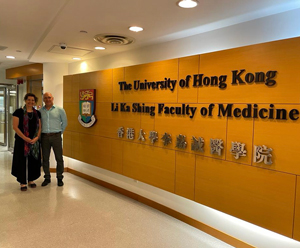 Dr. Patricia Luck recently traveled to the University of Hong Kong as an invited speaker to their Medical Ethics and Humanities Unit. The title of the presentation was “Shame and Stigma in Medical Education: Through the Lens of the Health Humanities.”
Dr. Patricia Luck recently traveled to the University of Hong Kong as an invited speaker to their Medical Ethics and Humanities Unit. The title of the presentation was “Shame and Stigma in Medical Education: Through the Lens of the Health Humanities.”
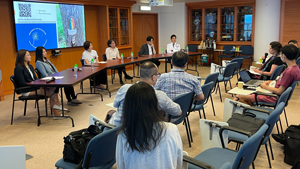 During her visit, Dr. Luck discussed the shame and stigma in medication education alongside Hong Kong University faculty members and MBBS students. They shared their valuable views from the perspectives of healthcare professionals/educators, psychologists/student counsellors, and students as well as their views on medical education in general.
During her visit, Dr. Luck discussed the shame and stigma in medication education alongside Hong Kong University faculty members and MBBS students. They shared their valuable views from the perspectives of healthcare professionals/educators, psychologists/student counsellors, and students as well as their views on medical education in general.
To quote the HKU Medical Ethics & Humanities Unit, “Let us work collaboratively to create a more compassionate and empathetic learning environment for our students, thereby enabling them to become humanistic physicians who prioritize the human aspect of healthcare.”
Dr. Lainie Ross Quotes in Recent Nature Article
Dr. Lainie Ross was recently quoted in an article in the journal Nature titled, “The Battle Over How to Redefine Death” by Max Kozlov. In the article, Kozlov talks about the differences in ideology that threaten US efforts to harmonize the definition of brain death across the country.
You can read the full article here.
Netflix’s hit Take Care of Maya scratches the surface of a huge problem
Mical Raz, the Charles E. and Dale L. Phelps Professor in Public Health and Policy, and a professor of history and of clinical medicine, discusses the Netflix documentary Take Care of Maya, which follows the plight of a family facing an accusation of child abuse. You can read the full article here.
Year-Out Student Sabrina Jamileh Sayegh Presents Pathway Project Proposal
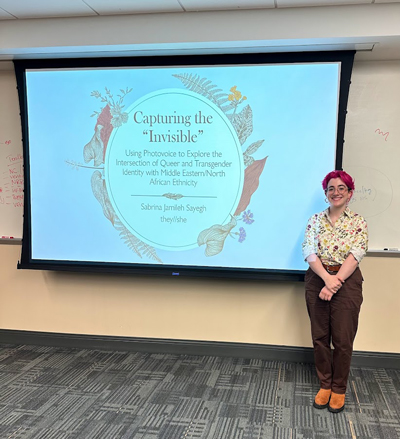 Year-Out medical student Sabrina Jamileh Sayegh presented their Health Humanities & Bioethics Pathway project proposal “Capturing the ‘Invisible’: Using Photovoice of Queer and Transgender Identity with middle Eastern/North African Ethnicity.”
Year-Out medical student Sabrina Jamileh Sayegh presented their Health Humanities & Bioethics Pathway project proposal “Capturing the ‘Invisible’: Using Photovoice of Queer and Transgender Identity with middle Eastern/North African Ethnicity.”
Literature on the lived experiences of queer and transgender (QT) Middle Eastern and North African (MENA) Americans is very limited. Within the small amount of literature that Sabrina has found, queer transgender American’s have higher rates of mental health disorders and suicide rates. MENA Americans struggle with denial of and the stigma around their health needs and queer MENA people have unique experiences developing their identities. Sabrina’s study seeks to explore this identity intersection using the Photovoice method.
For this year-long study, Sabrina hopes to achieve the following objectives:
- Assist in building and participating in a community of QT MENA Americans brought together through this project
- Understand how the intersection of QT identity and MENA ethnicity influences one’s interactions with self, community, and healthcare institutions
- Explore the strengths and resilience associated with this identity intersection
- Provide insight into this community’s experiences and needs
- Create a physical, interactive exhibit of community members’ photographs and stories
We cannot wait to see the results of this study!
Good work Sabrina!
Dr. Lainie Ross Presents at University of Zurich’s Caring for the Orphans Conference
Dr. Lainie Ross gave a presentation at the University of Zurich on Thursday, June 15th as part of the Caring for the Orphans: Ethical Issues in the Context of Rare Diseases conference. Her talk was titled, “Thinking zebras not horses when the herd runs past: Atypical Diabetes Mellitus.”
This conference brought together scholars from diverse fields such as medical ethics, philosophy, medicine, and the social sciences to address the complex issues regarding rare diseases in children. The primary objective of this conference was to foster discourse on the ethical, legal, and social implications of rare diseases. The conference is part of the University Research Priority Program (URPP) ITINERARE (Innovative Therapies in Rare Diseases) at the University of Zurich.
Dr. Ross’s talk can be viewed here.
Dr. Ross named Dean’s Professor of Health Humanities & Bioethics
On May 17th, 2023, Dr. Lainie Ross received the Dean’s Professor of Health Humanities & Bioethics professorship at the 2023 School of Medicine Faculty Awards.
For a complete list of award recipients, click here.
Dr. Ross Presents at CHOP Pediatric Grand Rounds
Dr. Lainie Ross, chair of the Department of Health Humanities & Bioethics, was invited to present at the Children’s Hospital of Philadelphia Pediatric Grand Rounds on May 17, 2023. The title of her talk was “Intellectual Disability and Organ Transplantation: An ethical analysis.”
You can watch the recording of her talk here.
Dr. Ross Quoted in Recent Article
Dr. Lainie Ross, chair of the Department of Health Humanities & Bioethics, was quoted in the May 2023 edition of Medical Ethics Advisor in the article “Living Donor Liver Transplant Raises Multiple Ethical Questions” You can read the full article here.
Lainie Friedman Ross Receives Honorary Doctorate of Humanities
On May 12, 2023, during the commencement ceremony at Oakland University in Rochester, Michigan, Lanie Friedman Ross, MD, PhD, will receive an honorary Doctor of Humanities degree for her exemplary scholarship and leadership in bioethics. Ross recently joined URMC as the inaugural Chair of Health Humanities and Bioethics and serves as director of the Paul M. Schyve, MD Center for Bioethics.
At Oakland University, the William Beaumont School of Medicine is a relatively new institution, established in July 2008. Ross’s nomination comes during the creation of their first Center for Moral Values and Medicine. Three bioethicists at the university recommended her for this honor, stating that she is “arguably the most influential, accomplished, and important pediatric ethicist of our time.”
Ross’s core areas of expertise include ethical and policy issues in pediatrics, clinical decision making, death and organ transplantation, genetics/genomics, clinical research ethics, and human subject protections. She has published five books, over 225 peer-reviewed journal articles and book chapters, and is currently writing a sixth book examining ethical issues related to siblings in health care.
“I’m thrilled to receive this honorary Doctor of Humanities degree,” said Ross. “It is a validation of the importance of bioethics in academic medicine and the training of the next generation of clinicians in both the art and science of medicine.”
Dr. Jon Herington Presents at the Bioethics Noon Conference Series
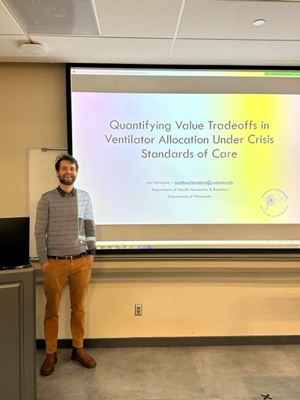 On Wednesday, May 3rd, Dr. Jon Herington presented “Quantifying Value Tradeoffs in Ventilator Allocation Under Crisis Standards of Care” during the Interdisciplinary Bioethics Noon Conference Series.
On Wednesday, May 3rd, Dr. Jon Herington presented “Quantifying Value Tradeoffs in Ventilator Allocation Under Crisis Standards of Care” during the Interdisciplinary Bioethics Noon Conference Series.
Policies designed to ethically allocate scarce resources often rely on untested assumptions about tradeoffs between ethical values (i.e. saving the most lives, saving the most life years, and non-discrimination against the chronically ill). Because these policies are implemented in complex, dynamic systems, many assumptions about these tradeoffs may turn out to be false. Thus, a rigorous and reproducible methodology to test such
assumptions is essential for bioethics to properly inform policymaking. Using a unique time series dataset of all ICU patients admitted to a large medical center during 2020-2021, we use Monte Carlo methods to simulate implementation of three different COVID-19 ventilator allocation protocols given different levels of scarcity.
MS Medical Humanities Students Present Final Capstone Projects
On Tuesday, March 24th, two of the graduating students from the MS Medical Humanities Program presented their final capstone projects to fellow students & department faculty.
Gretchen Strobbe’s project was titled, “Typologies in the Endo Narrative: An Exploration of the Voices that Penetrate Silence, Stigma, and the Struggle to Write About Pain.”
Alejandro Vera’s project was titled, “The Lived Experience of Vitiligo in the Visual Arts.”
Congratulations Gretchen & Alejandro on all your hard work and fantastic final projects!
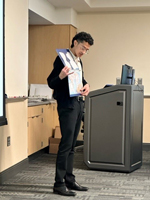
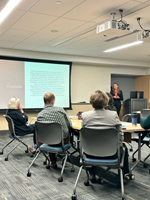
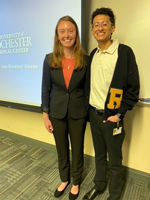
Erik Larsen & Patricia Luck Finalists in AAMC NEGEA Conference
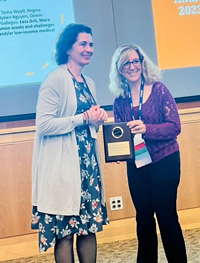 Several members of the department attended the Association of American Medical Colleges Northeast Group on Educational Affairs Conference in April. Erik Larsen and Patricia Luck were picked as finalists for the Excellence in medical Education Oral Abstract Presentation Award with Patricia winning 1 of the 4 awards for “The Photo/Tiny Story: A Novel Activity for Reflective Practice in Medical Education."
Several members of the department attended the Association of American Medical Colleges Northeast Group on Educational Affairs Conference in April. Erik Larsen and Patricia Luck were picked as finalists for the Excellence in medical Education Oral Abstract Presentation Award with Patricia winning 1 of the 4 awards for “The Photo/Tiny Story: A Novel Activity for Reflective Practice in Medical Education."
Congratulations Erik & Patricia!!
Laura Stamm received a grant from the Humanities Center for her project: “Making Public History: Oral Histories of COVID-19 and Rochester’s Black Communities”
This project seeks to provide a collection that captures the impact of COVID-19 on Rochester’s black communities. Using community-based participatory research methods (CBPR), this project will listen to, record, and preserve the experiences of those made most vulnerable by the pandemic. It is a widely accepted fact that COVID-19 disproportionately affects black communities, but there is little research available on how COVID-19 and the impact of the disproportional burden differently affects black communities. Moreover, most research on COVID-19 in marginalized communities is told from the perspective of scientific researchers, rather than by individuals who experience the everyday impact of the pandemic. Scholarship on vaccine hesitancy in the black community, for example, typically cites survey data and theorizes about why black people might not trust medical institutions without hearing directly from black community members about why their experiences and understandings of history cause them to distrust medicine. The proposed project will provide a collection of stories about COVID-19 directly from voices of Rochester’s black communities that centers their experiences and provides a new narrative of life and health during a global pandemic. Preserving these black oral histories in an archival collection and digitized open access platform affirms their historical importance and assures their existence for future generations.
Congratulations Laura!!
Expanding the Role of Justice in Secondary Research Using Digital Psychological Data
Jonathan Herington1, Kevin Li2, Anthony R.Pisani3
1 Department of Health Humanities and Bioethics and Department of Philosophy, University of Rochester
2 Department of Family Medicine, University of Rochester
3 Center for the Study and Prevention of Suicide, Department of Psychiatry & Department of Pediatrics, University of Rochester
Abstract: Digital psychological data (DPD) can advance behavioral health research. Under current practices, much of secondary research does not require human subjects research review because data are de-identified. This standard approach to the ethics of secondary research (i.e. de-identification) does not address a range of ethical risks. We argue that greater emphasis should be placed on the ethical principle of justice. We outline inadequacy of an individually-focused research ethic for DPD and describe the range of unaddressed “social risks” generated by secondary research of DPD. These risks exist in the “circumstances of justice”: i.e. a circumstance where individuals must cooperate to create a public good (e.g. research knowledge), and where it is impractical to individually exempt individuals. Instead, we recommend greater emphasis upon the just allocation of benefits and burdens against a background of social cooperation. We explore six considerations for researchers who wish to use DPD in secondary research without explicit consent: (i) create socially valuable knowledge, (ii) fairly share the benefits and burdens of research, (iii) be transparent about data use, (iv) explore mechanisms for withdrawal of data, (v) ensure that stakeholders can provide input into the design and implementation of the research, and (vi) responsibly report limitations.
Congratulations Jon & Kevin!
Dr Shaw speaks with Boston Globe
Dr. Margie Shaw spoke with the Boston Globe and was quoted for the article, “Foundation stirs controversy by charging cancer patients $83,000 for unproven but promising experimental drug.”
Special Lecture: "Conceptually Engineering Disability"
Monday March 13th, 2023 11am, CEL 2-7520
Congratulations to the Alpha Omega Alpha Inductees for 2023!
We are excited to announce that we had several Pathways students as well as our own Dr. Margie Shaw inducted into Alpha Omega Alpha.
Congratulations Spencer Chen, Dalton LeBarge, Christian Dohring & Courtney Vidovich!
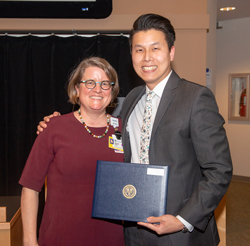
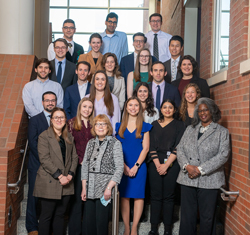
‘Changing Perspectives Through the Arts’ event
The Department of Health Humanities and Bioethics presents “Drawing On and From Healthcare” with Kriota Willberg, the next installment of the “Changing Perspectives Through the Arts” series, a collaboration of the Department of Health Humanities and Bioethics, Eastman Performing Arts Medicine, and Rochester community organizations. The event takes place Friday, March 10, at noon in the School of Medicine and Dentistry, Auditorium K-207 (2-6408), and via Zoom. Learn more and register for the Zoom link here.
Music Therapy Finds Its Rhythm at URMC
March is Music Therapy Month and, to honor URMC's music therapy program, we're taking you on a journey to discover the important work our team is doing to help patients—young and old—benefit from the healing sounds of music. Learn how the program began 25 years ago, and how it has grown to care for thousands of patients since its inception. Meet our team of music therapy collaborators and hear how their dedicated work resonates throughout the halls of our hospital.
Music Therapy Finds its Rhythm at URMC - URMC Today (rochester.edu)
The Nocturnist Podcast – Jackie Howitt’s Experience Volunteering During COVID Pandemic
OB/GYN Jackie Howitt and pediatrician Gretchen Volk bring us into the deserted airport where they first met in April 2020 on their way to offer COVID-19 relief in NYC. Though their friendship began at one of the most disorienting moments in their lives, the coincidences that followed made the connection feel almost fated.
Listen here: Serendipity in Shutdown — the NOCTURNISTS
Anatomy of Hate Grand Rounds – “Breaking the Silence: Dismantling Hate Through Restoring Community”
We have a unique opportunity to engage with an expert in restorative justice. Dr. Pedro Flores will be in Rochester next Tuesday, March 28 and Wednesday, March 29.
Reserve your spot now to learn about truth-telling, accountability, and reconciliation through restorative justice circles. Pedro Flores, Ph.D., a restorative justice practitioner, clinician, and healthcare administrator from Southern California, will host one virtual and two in-person circles on Tuesday, March 28th and Wednesday March 29th.
These sessions wrap up the Anatomy of Hate Grand Rounds series sponsored by the Office of University Engagement and Enrichment in partnership with the Department of Health Humanities and Bioethics, Paul M. Schyve, MD Center for Bioethics, and the Office of Alumni Relations and Constituent Engagement.
Special Lecture: "E’s a Funny Doctor: Dickie Orpen’s Second World War Cartoons and the Palliative Humor of the Surgical Ward"
Christine Slobogin, MPhil, PhD
Postdoctoral Fellow, Center for Medical Humanities
Johns Hopkins University
Friday March 31st, 2023, 11am - 12pm
Anderson Room (G-8534)
Special Lecture: "Healthy Forever? Medicine, Society, and the Life Co urse Transformed in Twentieth-Century America"
Cara Fallon, PhD
Lecturer in Global Health,
Yale University
Monday April 1st, 2023, 11am - 12pm
Natapow Room (1-9545)
Highlighted News
- Anatomizing Hate session from our Anatomy of Hate series - watch the video
- Rochester healthcare community addresses bias in the calculation of eGFR in adults
- National Student Bioethics Association Virtual Conference, May 21, 2022, call for abstracts
- Greater Resources, and Reach, for New Health Humanities and Bioethics Department
- More Pre-Med Students Opting for Health Humanities Programs


